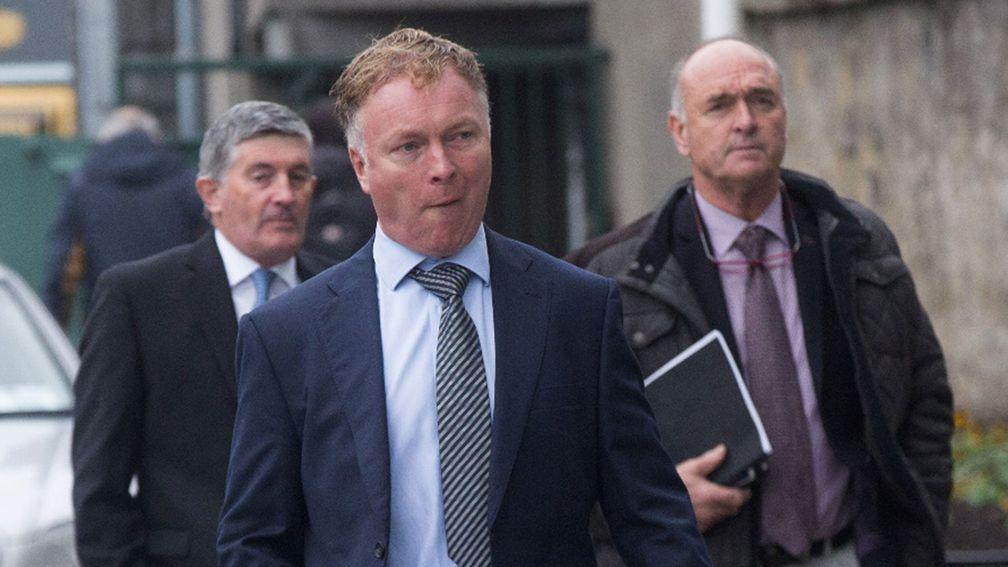IHRB defends its anti-doping protocols after Sunday Times article

The Irish Horseracing Regulatory Board (IHRB) has issued a defence of its testing procedures after a piece by David Walsh appeared in the Sunday Times questioning Irish racing's anti-doping record.
Walsh framed his article in the context of the case against Tim Brennan, the veterinary surgeon who has now begun a two-month suspension after the Veterinary Council of Ireland initiated fitness-to-practise proceedings.
Brennan, who is Willie Mullins' vet, had been found to have unlicensed remedies in his jeep when it was inspected by department of agriculture officials at Mullins' Closutton yard in 2015.
At a court hearing in Kilkenny in 2017, Brennan pleaded guilty to possession of the products. The court found that his offences were at the lower end of the scale and gave him the benefit of the probation act, which meant no conviction was recorded against him.
Damning data
Walsh also focused on the historical findings of commercial quantities of anabolic steroids in the possession of vet John Hughes, who was banned from racing for life after it was established he had been importing nitrotain from Australia. Hughes never revealed who he had been supplying.
Walsh drew attention to the fact that 2018 data suggests an Irish-trained horse was 4.7 times more likely to test positive in Britain than a British-based horse, a likelihood that increased to 8.9 if restricted to National Hunt horses. He noted it dropped to 2.2 times more likely in 2019.
After the IHRB severed its ties with BHP Laboratories in Limerick at a cost of around €500,000 in February 2018, the switch to LGC's lab in Newmarket resulted in a 440 per cent increase in positive tests unearthed by the IHRB.
Walsh's article, which didn’t carry an official response from the authorities, made no distinction between substances that are prohibited at all times and permitted substances with advised withdrawal times that are banned on race day.
IHRB respond
A statement issued by the IHRB on Sunday read: "In July this year, the IHRB became the first horseracing jurisdiction in the world to enhance race day anti-doping testing by taking hair samples unannounced at the racecourse.
"Testing of the race winner by blood, urine and/or hair samples was maintained for every race in Ireland during 2020, in addition to intelligence-led and random testing on a race day, out-of-competition testing and stable inspections, which combined to a total of 3,032 tests carried out by the IHRB up to and including November 30, despite restrictions relating to the Covid-19 pandemic."
Walsh also referred to the department having stepped back from accompanying IHRB officials on random stable inspections, but the IHRB statement indicated its relationship with the government entity has resumed.
"During the course of this year numerous pieces of intelligence have been assessed relating to licensed individuals and non-licensed premises which included a sharing of intelligence with the BHA and the department of agriculture, food and the marine (DAFM)," it said.
"No evidence of doping was identified throughout this process and investigations remain ongoing. As recently as this week officials from DAFM accompanied officials from the IHRB at a stable inspection and the special investigations unit of DAFM continue to work with us in a positive manner with regard to all regulatory aspects including investigations."
'We've increased our investment in anti-doping over the past number of years'
Walsh also referred to elements of the industry-wide agreement on anti-doping that have still to be implemented, most notably the capacity to test on unlicensed premises. Last summer, the IHRB was granted the authority to inspect premises that don't come under its jurisdiction, but it has yet to enforce that power.
Of its out-of-competition strategy, the statement noted: "There has been a 236 per cent increase in the number of samples taken away from the racecourse and out-of-competition testing has increased from 8 per cent of the total samples in 2016 to 21 per cent of total samples in 2019."
On Sunday, Brian Kavanagh, chief executive of HRI, which funds the IHRB's integrity department, also defended the sport's anti-doping programme.
"It's obviously an important issue and we've increased our investment in anti-doping over the past number of years with increased budgets for the IHRB," he said. "We haven't been advised of any concerns of the nature that were outlined this morning."
Read more
'It's the number one problem in Irish racing' - Bolger demands more drug testing
Irish authorities given powers to investigate unlicensed premises by government
Mullins vet Tim Brennan cleared of corruption charge in Faugheen inquiry
Punchestown winner one of two Irish horses disqualified following drug tests
Join Members' Club Ultimate and read tipping from the likes of Pricewise and Paul Kealy, all the big interviews and features, daily comment and news analysis - plus our Ultimate Daily newsletter. Click here to sign up.
Published on 20 December 2020inNews
Last updated 19:29, 20 December 2020
- Merci Olivier! No final winner for Olivier Peslier but the world of racing unites in saluting the end of a great career
- The latest edition of the Racing Post is available to read online now - here's how you can access it
- How Smart View recorded a 76 per cent profit at the Cheltenham Festival
- Smart View is available on the Racing Post app - how to read the revolutionary new racecard
- Levy reform talks 'accelerating' as clock ticks down to April deadline for agreement
- Merci Olivier! No final winner for Olivier Peslier but the world of racing unites in saluting the end of a great career
- The latest edition of the Racing Post is available to read online now - here's how you can access it
- How Smart View recorded a 76 per cent profit at the Cheltenham Festival
- Smart View is available on the Racing Post app - how to read the revolutionary new racecard
- Levy reform talks 'accelerating' as clock ticks down to April deadline for agreement